Is Royal Canin a Good Pet Food?
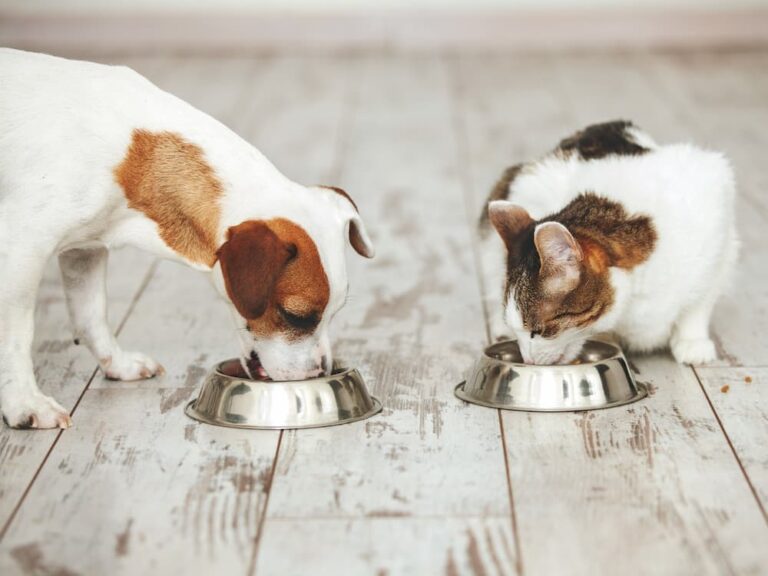
Fast Facts About Royal Canin Pet Food
| Parent company: Mars Inc. |
| Year founded: 1968 |
| Country founded: France |
| Species: Dogs and cats |
| Types of food: Standard diets (available at retail): dry kibble, wet food, fresh; Therapeutic diets (available with veterinary approval): dry kibble, wet food |
| Health issues targeted: Digestive sensitivity, food sensitivities, skin and coat sensitivity, urinary sensitivity, kidney support, liver support, joint sensitivities, oral hygiene, cardiac (heart), diabetes support, and weight management |
All featured products are chosen at the discretion of the GreatPetCare editorial team and do not reflect a direct endorsement by the author or reviewer.
Whether you’ve seen Royal Canin pet food for sale at your local pet store or on the shelf in your vet’s waiting room, you might be wondering, “Is Royal Canin a good dog food or cat food?” In short, yes!
Royal Canin has a long history of supporting pet health through nutrition. All Royal Canin’s pet foods are backed by science and formulated with the help of board-certified veterinary nutritionists. So pet parents can feel good about providing quality nutrition for their pets.
Royal Canin’s dog and cat food provides high-quality nutrients to support pets of various life stages, sizes, and breeds. There are even over-the-counter diets that address certain concerns, like joint health, skin and coat health, and hairballs.
The company also offers a variety of prescription therapeutic diets that you can only buy with veterinary approval. These diets, which include Royal Canin Urinary SO, Royal Canin Gastrointestinal, and Royal Canin Hydrolyzed Protein (HP), among others, are intended to manage specific health conditions.
With more than 350 foods available, there’s a Royal Canin diet for every dog and cat at every life stage.
Royal Canin Dog Food
Royal Canin Cat Food
Overview of Royal Canin Pet Food
Royal Canin was founded in Gard, France, in 1968 by Dr. Jean Cathary, a French veterinarian who believed that food could impact the health of animals. Royal Canin was sold to Mars Inc. in 2002 and is now part of the Mars Petcare division.
Royal Canin is a global company, distributing pet food in more than 100 markets. The worldwide headquarters are in Aimargues in the south of France. In the United States, Royal Canin is headquartered in St. Louis, Missouri, and has manufacturing facilities in Nebraska, Ohio, South Dakota, and Tennessee.
Since the company’s beginnings in the 1960s, Royal Canin has focused on health through nutrition using an approach that’s informed by research from nutritionists, veterinarians, and scientists from across the world. According to the company, Royal Canin’s nutritional philosophy is rooted in three main principles: the needs of cats and dogs first, nutritional precision, and constant innovation.
Nutritional adequacy, safety, and quality control are the cornerstones of Royal Canin’s pet foods. The company:
- Manufactures every pet food they sell in facilities they own
- Chooses ingredients based on their high nutritional content and the health benefits they offer to pets
- Makes efforts to source raw materials from accredited suppliers close to production centers to ensure freshness, support the local economy, and reduce their carbon footprint
- Tests incoming ingredients and finished products to validate nutrient composition
- Performs quality-control tests on pet foods during manufacturing and before they are shipped to customers
- Offers a 100% satisfaction Palatability Guarantee for superior taste, quality, and consistency
We reached out to Dr. Abel Gonzalez, DVM, to get a veterinarian’s perspective on Royal Canin pet food, especially the prescription line. “I’ve been feeding Royal Canin exclusively to my own pets since vet school,” he says. “No sponsorships, no conflicts of interest, just genuine trust in the science and the results I’ve seen firsthand.”
Types of Royal Canin Dog Food

Royal Canin offers specialized formulas targeted to pets’ specific nutritional needs, such as age (puppy, junior, adult, mature, and senior), size (X-small, small, medium, large, and giant), breed (18 specific breeds), and a variety of health concerns, including:
- Skin and coat sensitivity
- Digestive sensitivity
- Food sensitivities
- Urinary sensitivity
- Kidney support
- Liver support
- Weight management
- Joint sensitivities
- Oral hygiene
- Diabetes support
- Cardiac support
Royal Canin’s prescription therapeutic diets are designed with scientifically formulated nutrient profiles that support pets with specific medical conditions, including urinary or gastrointestinal issues. These complete-and-balanced diets are specifically designed to be palatable — that means tasty to your dog. After all, they can’t work if the dog won’t eat them.
“Nutrition is one of the most powerful tools we have in veterinary medicine,” Dr. Gonzalez says “When used intentionally and guided by a veterinarian, prescription diets can transform a pet’s health, reduce medications, and prevent relapse.”
Dr. Gonzalez lists Royal Canin’s Gastrointestinal, Hydrolyzed Protein, and Urinary SO lines as standouts in his own practice. “They’re reliable, palatable — even for picky eaters — and consistently deliver clinical improvement when paired with proper diagnostics and follow-up,” he says.
Royal Canin Gastrointestinal Low Fat Dog Food
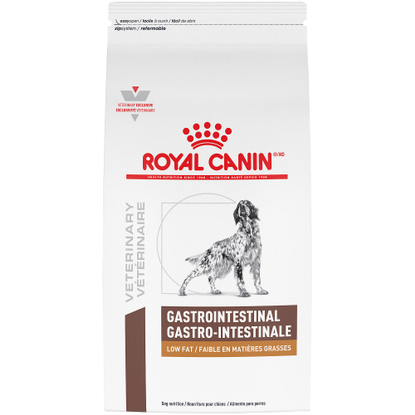
| Key benefits | Low fat, EPA+DHA, digestive health |
| Life stage | Adult (maintenance) |
| First five ingredients (dry formula) | Brewers rice, chicken by-product meal, barley, natural flavors, pork digest |
| Crude protein (min) | 20% |
| Crude fat (min) | 5% |
| Crude fiber (max) | 4.8% |
| Calories | 247 calories per cup |
Royal Canin Gastrointestinal Low Fat dog food benefits dogs who have trouble digesting foods high in fat. These diets help support GI issues in dogs (vomiting, diarrhea, or reduced appetite) due to certain medical conditions, such as:
- Gastroenteritis – inflammation of the stomach and intestines
- Pancreatitis – inflammation of the pancreas
- Inflammatory bowel diseases
Formulated with highly digestible proteins, balanced fibers including prebiotics, and EPA and DHA fatty acids, this diet helps support the dog’s overall digestive health.
Royal Canin Gastrointestinal Low Fat dog food comes in dry kibble and canned options, making it easy to find the right formula for your dog. This Royal Canin wet dog food is especially helpful for picky eaters or dogs who need softer textures.
Additional prescription dog food formulas available to support GI health include:
- Gastrointestinal Moderate Calorie (reduced calories for weight maintenance)
- Gastrointestinal High Fiber
- Gastrointestinal Low Fat Small Dog (smaller kibble size)
- Gastrointestinal Puppy Ultra Soft Mousse In Sauce (for puppies with gastrointestinal sensitivities)
- Gastrointestinal + Hydrolyzed Protein (for dogs with food sensitives or allergies)
Royal Canin Urinary SO Dog Food

| Key benefits | Urinary support |
| Life stage | Adult (maintenance) |
| First five ingredients (dry formula) | Brewers rice, corn, chicken fat, chicken by-product meal, brewers rice flour |
| Crude protein (min) | 17% |
| Crude fat (min) | 15% |
| Crude fiber (max) | 3.7% |
| Calories | 333 calories per cup |
Royal Canin Urinary SO dog food is intended for dogs who tend to develop bladder stones and crystals. If that sounds like your pup, switching to this diet could help provide long-term support for your pet’s urinary health.
This prescription dog food for bladder stones helps dissolve pure struvite stones and prevents struvite and calcium oxalate stones and crystals from forming.
This diet also increases urine output to help dilute and flush out excess minerals that cause crystals and stones.
Royal Canin Urinary SO dog food comes in dry kibble, canned loaf wet food, and canned slices in gravy wet food.
Additional prescription dog food formulas available to support urinary health include:
- Urinary SO + Satiety (blend of fibers helps the dog feel full longer)
- Urinary SO Moderate Calorie (reduced calories for weight maintenance)
- Urinary SO + Hydrolyzed Protein (for dogs with food sensitivities or allergies)
- Urinary SO Aging 7+ (kidney support, plus vitality and cognition support)
- Urinary SO Small Dog (smaller kibble size)
- Urinary UC (prevents urate stones)
Royal Canin Hydrolyzed Protein Dog Food
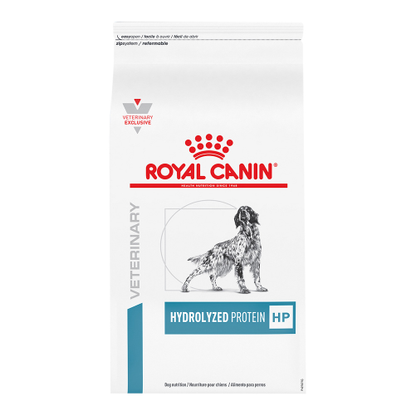
| Key benefits | Hydrolyzed protein, EPA+DHA, digestive health |
| Life stage | Adult (maintenance) |
| First five ingredients (dry formula) | Brewers rice, hydrolyzed soy protein, chicken fat, natural flavors, dried plain beet pulp |
| Crude protein (min) | 19% |
| Crude fat (min) | 17% |
| Crude fiber (max) | 3% |
| Calories | 324 calories per cup |
Royal Canin Hydrolyzed Protein HP is a hypoallergenic diet designed for dogs with food allergies or sensitivities. It’s also used in elimination trials to diagnose food allergies in dogs. Royal Canin’s Hydrolyzed Protein formula is not like regular dog food. The protein ingredients are hydrolyzed — broken down into such tiny pieces that the dog’s immune system doesn’t recognize them — so the dog doesn’t react to the food. This food is also designed to support healthy digestion by keeping things moving smoothly through the dog’s system and promoting a good balance of gut bacteria. It includes EPA and DHA fatty acids to support healthy skin and good digestion.
Royal Canin Hydrolyzed Protein HP dog food comes in dry kibble and canned loaf wet food.
Additional prescription dog food formulas available to address food allergies and sensitivities include:
- Ultamino (extensively hydrolyzed protein, specialized production process to avoid cross-contamination)
- Hydrolyzed Protein Small Dog (smaller kibble size and adapted to meet digestive, dental and urinary sensitivities of small dogs)
- Hydrolyzed Protein Moderate Calorie (reduced calories for weight maintenance and restricted phosphorus to support renal health)
- Urinary SO + Hydrolyzed Protein (to dissolve and prevent urinary stones and crystals)
- Hydrolyzed Protein Puppy (meets the nutritional needs of growing puppies)
- Hydrolyzed Protein SO Aging 7+ (kidney support, plus vitality and cognition support)
- Hydrolyzed Protein + Satiety (blend of fibers helps the dog feel full longer, promotes weight management)
- Hydrolyzed Protein PS (potato and soy)
- Vegetarian (proteins exclusively from vegetable origin)
- Selected Protein PR (potato and rabbit)
- Selected Protein PD (potato and duck)
- Selected Protein PW (potato and fish)
- Selected Protein PW Moderate Calorie (potato and fish, reduced calories for weight maintenance)
Is Royal Canin a Good Dog Food?
Yes, Royal Canin is a good dog food for any dog, but particularly for dogs who need extra support for specific health concerns.
Based on Royal Canin dog food reviews and veterinary feedback, this brand is known for reliability and consistent clinical results. Backed by science and dedication to quality, Royal Canin foods are carefully formulated, thoughtfully sourced, and regularly tested for nutritional adequacy and safety.
One thing pet parents need to consider about Royal Canin dog food is the price. Considered a “premium” brand, Royal Canin foods cost more than some other dog foods. This price difference is particularly noticeable in the therapeutic prescription line, although these foods might be covered under some pet insurance policies when they are deemed medically necessary.
“Prescription diets are more than food — they’re a form of medical treatment,” Dr. Gonzalez says. “You’re not paying for the brand; you’re paying for decades of science, clinical testing, and consistent results.”
“When used correctly, such diets often reduce the need for medications, prevent flare-ups, and improve long-term quality of life,” he notes. “That makes them not just worth it, but often the most cost-effective choice in the long run.”
Types of Royal Canin Cat Food
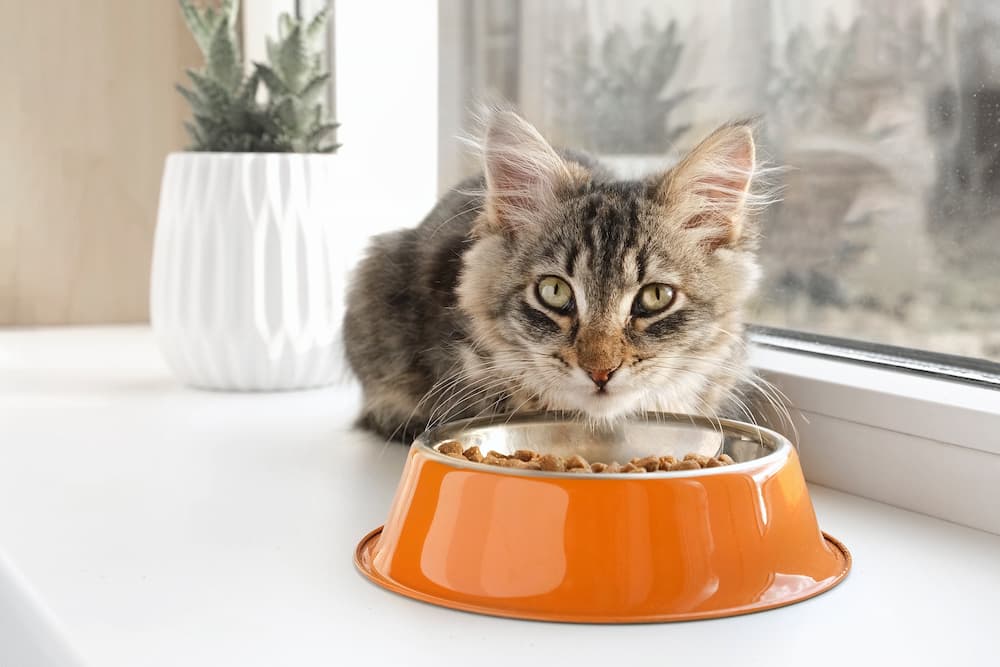
Like the brand’s dog foods, Royal Canin’s cat foods come in formulas designed to target specific nutritional needs. There are diets tailored to age (kitten, adult, mature, and senior), breed, spay or neuter status, and lifestyle (indoor).
As well, Royal Canin feline diets are formulated to address a variety of health concerns, including:
- Skin and coat support
- Digestive support
- Food sensitivities
- Urinary support
- Kidney support
- Weight management
- Oral hygiene
- Diabetes support
- Stress support
- Hairballs
Royal Canin’s feline prescription therapeutic diets support cats with specific medical conditions, including urinary problems and food allergies or sensitivities. Although all Royal Canin’s retail diets support overall health, including some specific health concerns, the prescription diets offer more targeted nutrition to help manage diagnosed conditions.
“Prescription diets are formulated and tested to treat or manage specific conditions, not just to ‘support’ general wellness,” Dr. Gonzales says. “Over-the-counter sensitive-stomach diets can help with mild issues, but prescription lines like Royal Canin’s GI formulas are built on controlled clinical research and precision nutrition.”
All Royal Canin’s complete-and-balanced diets are guaranteed to taste good — something extra important for cats, who are known to be finicky, especially in times of illness.
Royal Canin Urinary SO Cat Food
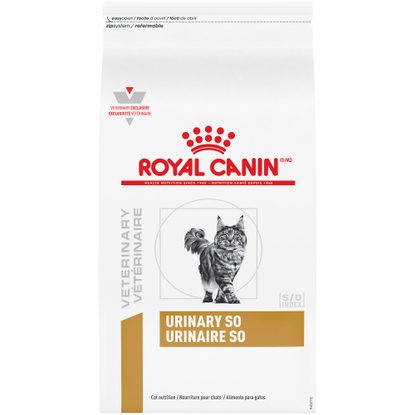
| Key benefits | Urinary support |
| Life stage | Adult (maintenance) |
| First five ingredients (dry formula) | Chicken by-product meal, brewers rice, corn, corn gluten meal, chicken fat |
| Crude protein (min) | 32.5% |
| Crude fat (min) | 13% |
| Crude fiber (max) | 4% |
| Calories | 315 calories per cup |
Royal Canin Urinary SO cat food is intended for cats who tend to develop bladder stones and crystals. Bladder stones and crystals tend to be more dangerous in cats compared to dogs, especially in males. Male cats tend to have narrow urethras, which can easily become completely blocked — a potentially life-threatening medical emergency.
Royal Canin Urinary SO cat food provides long-term support for your cat’s urinary health. It’s formulated to help dissolve pure struvite stones and prevent struvite and calcium oxalate stones and crystals from recurring.
Does your cat suffer from urinary tract infections or feline lower urinary tract disease (FLUTD)? While Royal Canin Urinary SO Cat Food is not a cure, it may help reduce the risk of health issues associated with the lower urinary tract (bladder and urethra). If testing shows signs of crystals, blood, inflammation and infection in your cat’s urine, your vet may recommend this type of urinary infection cat food as part of ongoing care.
Cats can be very picky about the type of food they eat, so it’s great that Royal Canin Urinary SO cat food comes in multiple forms. Your cat can feast on Royal Canin dry cat food for urinary health, as well as canned loaf in sauce, canned thin slices in gravy, and canned morsels in gravy.
Royal Canin Urinary SO is one of the most trusted urinary care cat food options on the market. If your cat needs long-term urinary health cat food, this line offers multiple formulas to choose from. Additional prescription cat food formulas available to support urinary health include:
- Urinary SO Moderate Calorie (reduced calories for weight maintenance)
- Urinary SO + Calm (stress reduction)
- Urinary SO + Satiety + Calm (blend of fibers helps the cat feel full longer, plus stress reduction)
- Urinary SO Aging 7+ + Calm (aging support, kidney support, plus stress reduction)
- Urinary SO + Hydrolyzed Protein (for cats with food sensitives or allergies)
Royal Canin Hydrolyzed Protein Cat Food
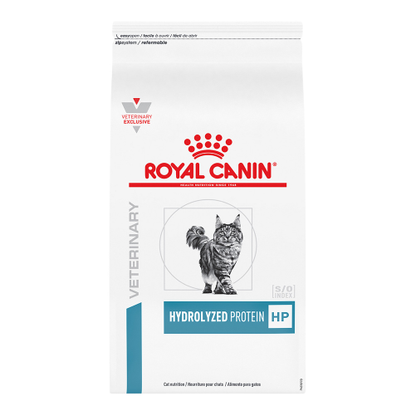
| Key benefits | Hydrolyzed protein, EPA+DHA, digestive health |
| Life stage | Adult (maintenance) |
| First five ingredients (dry formula) | Brewers rice, hydrolyzed soy protein, chicken fat, powdered cellulose, natural flavors |
| Crude protein (min) | 24.1% |
| Crude fat (min) | 18% |
| Crude fiber (max) | 5.9% |
| Calories | 330 calories per cup |
Royal Canin Hydrolyzed Protein HP is a hypoallergenic diet designed for cats diagnosed with food allergies or sensitivities, or suspected of having them.
Unlike regular cat food, the protein ingredients in Royal Canin’s Hydrolyzed Protein are broken down into tiny pieces by a process called hydrolysis. As a result, the cat’s immune system doesn’t recognize them, so the cat doesn’t have an allergic reaction to the food.
This food is also designed to support healthy digestion by keeping things moving through the cat’s system and helping to balance gut bacteria. This food includes EPA and DHA fatty acids to support healthy skin and good digestion.
Royal Canin Hydrolyzed Protein HP cat food comes in one form: dry kibble.
Additional prescription cat food formulas available to address food allergies and sensitivities include:
- Ultamino (extensively hydrolyzed protein, specialized production process to avoid cross-contamination)
- Urinary SO + Hydrolyzed Protein (to dissolve and prevent urinary stones and crystals)
- Satiety + Hydrolyzed Protein (special blend of fibers helps the cat feel full longer, promotes weight management)
- Selected Protein PR Loaf in Sauce (pea and rabbit, can be fed to adult cats or kittens)
- Selected Protein PD Loaf (pea and duck, can be fed to adult cats or kittens)
Is Royal Canin a Good Cat Food?
Yes, Royal Canin is a good cat food for any cat. But it’s particularly good for cats who benefit from specialized nutrition for urinary issues, food sensitivities, or digestive problems.
Is Royal Canin Worth It?
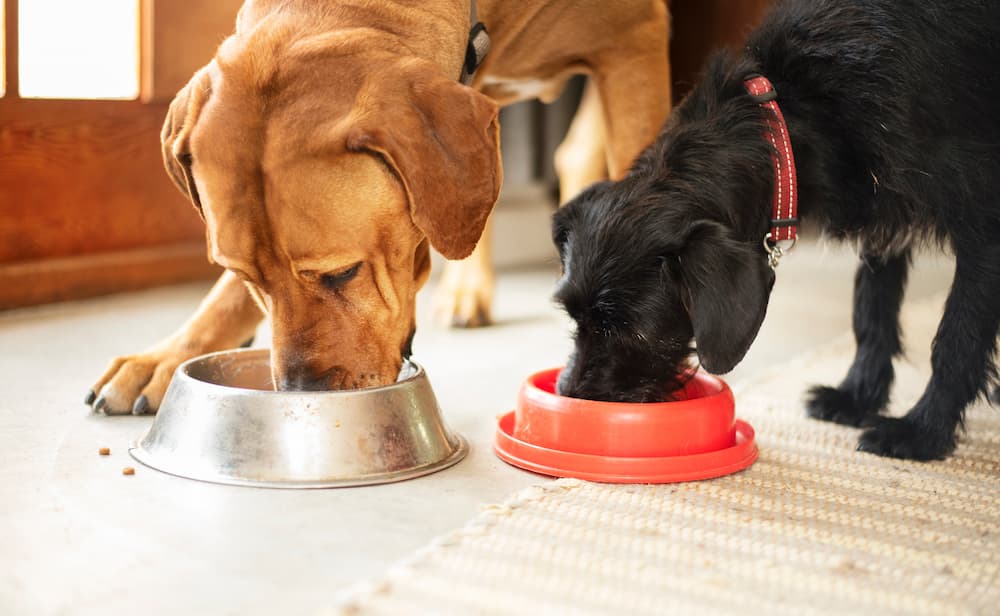
Although Royal Canin dog food and cat food are more expensive than some other brands, many vets and pet parents feel the health benefits justify the higher cost. Remember, prescription therapeutic diets may be covered under your pet insurance policy if they are medically necessary.
Talk to your veterinarian to see if a Royal Canin veterinary diet could help your pet. And always reach out to your vet before changing your pet’s food.
Remember, it’s important to make a gradual switch so your pet doesn’t experience an upset stomach. Mix increasing amounts of new food into the old over a period of one to two weeks until your pet is fully switched over. If you notice any trouble during the change, reach out to your vet for help.









